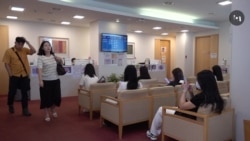Why a growing number of South Korean women are preserving their ability to have children later in life.
Welcome to VOA Asia Weekly. I'm Chris Casquejo in Washington. That story is coming up, but first, making headlines:
A former senior aide to New York Governor Kathy Hochul was charged Tuesday with acting as an undisclosed agent of the Chinese government. Linda Sun worked for the New York state government for more than 10 years. She was fired in March 2023 after her alleged wrongdoing was discovered.
Russian President Vladimir Putin received a lavish welcome from Mongolian President Ukhnaagiin Khürelsükh in the capital Ulaanbaatar Tuesday. Russia has talked for years about building a pipeline to carry 50 billion cubic meters of natural gas each year from its Yamal region across Mongolia to China. Russia needs to compensate for the loss of most of its gas sales to Europe since the start of the Ukraine war.
Taipei and the Pacific Islands have signed a cooperation agreement to extend their development partnership through 2027, according to the Taiwan Foreign Ministry. This comes after Pacific Islands Forum leaders on Saturday removed a reference to Taiwan in the final communique after Beijing’s top Pacific diplomat expressed outrage at its inclusion. A U.S. State Department spokesperson told VOA the efforts “fit a pattern of PRC coercion to constrain Taiwan’s international position.”
Pope Francis urged Indonesia to live up to its promise of “harmony in diversity” and fight religious intolerance, as he started an 11-day trip through the region. Francis had a meeting with outgoing President Joko Widodo at the presidential palace and members of the clergy at Jakarta’s main cathedral.
In South Korea, a growing number of women are opting out of having children, driven by financial challenges and career demands. But egg-freezing is emerging as a trend that allows women to delay parenthood while keeping their options open for the future.
VOA’s Bill Gallo explains from Seoul.
In Seongsu, a trendy district of Seoul, there are almost no strollers.
Children are now a rarity across South Korea, which has the world's lowest birth rate.
But this pop-up store, run by a fertility clinic, is offering a new choice.
Egg freezing – it's for those who may want children…just not right now.
“I don’t have a boyfriend now, and I don’t know when I’m going to get married. But I can’t turn back the clock on aging, so I invested money for the future to freeze my eggs.”
Lee Chae-rin now works at Seoul’s Maria Hospital to convince other women of the benefits of egg-freezing – a move the 31-year-old says has given her more freedom.
“Maybe it’s just because I really enjoy my life right now. But I think people naturally want to follow their passions – whether it’s studying, working more, or pursuing hobbies. For me, it’s surfing.”
Others cite financial strain and demanding work hours as barriers to starting a family.
“And women also experience problems, such as career breaks. If people can’t solve these issues, they just give up on having a child.”
Those pressures are understandable, says Maria Hospital’s Lim Tae-won.
“In the end, people deprioritize marriage and childbirth. And later, when they do want to have children, they’ve become less fertile.”
Instead, younger women can choose to freeze higher quality eggs for later use in in vitro fertilization, or IVF.
At Maria Hospital, Lim says egg-freezing procedures have more than tripled since 2019, partly due to government subsidies. The Seoul city government pays for about half of egg-freezing expenses.
“From this point of view, we think that egg-freezing will be a very essential solution to the low birth rate problem.”
No one knows how much this will actually improve South Korea’s demographic crisis.
But it may allow more women to feel in control of their future.
Bill Gallo, VOA News, Seoul, South Korea.
Visit voanews.com for the most up-to-date stories.
I’m Chris Casquejo.
Finally, Hong Kong's twin panda cubs have doubled in weight, with their markings becoming more visible two weeks after their birth.
Recent images and videos released by Ocean Park Hong Kong show the carefully nurtured cubs with growing black-and-white features on their eyes, ears, legs, torso, paws, and back. They were born August 15th.
Thanks for watching VOA Asia Weekly.











